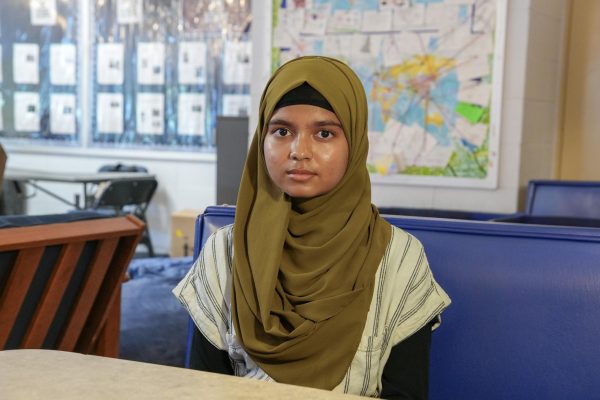
Last month, seniors presented research on “the ethics and aesthetics of friendship”at the annual two-day Humanities Symposium, a culminating event for the year-long seminar course all seniors take at Queens College.
Using the lens of friendship, seniors chose from a variety of challenging literary works, compiling a lengthy research paper, and presenting a condensed version during the Humanities Symposium.
Senior Phillip Dancel, whose presentation was about teenage angst, said “the preparation of the Symposium was quite a commitment for me and my group mates. We had from January when the Spring semester started at Queens College up to May to think of a creative way to connect our thesis texts to the theme of friendship.”
He said, “Our teachers and professors allowed us to choose one text to work with and brainstorm a topic that piqued our group’s interest as long as it related to the chosen text and the theme of the Symposium.”
Senior Mila Servania said, “I hoped to improve my presentation skills, primarily when it came to creating an academic, college-level one. It wasn’t that challenging as it was material I enjoyed working with.” Mila also spoke about how “[the class was] given a selection of works of fiction in various genres and had to pick the work that was the most interesting to [their] group.”
A panel of junior judges joined adult judges in scoring the seniors’ presentation, basing their scores off of a presentation rubric provided to them by English teacher and Classic advisor Brian Sweeney.
Junior Lucas Phildor said that being a judge this year allowed him to see what he would be doing next year. “All [presentations] gave great insight into what I need to do next year and how I can improve as a presenter,” he said.
The theme of this year’s symposium of the nature of friendships also resonated with the audience members.
Sophomore Victoria Ng noted the applications the presentations had to real world relationships. She said, “The most interesting part is I [got] to see a more in-depth analysis of different types of friendship because I do have experiences with bad friendships. And right [after attending the symposium] now I can actually see the signs of bad friendships and the progression of it.”
English teacher and UFT Chair Leader Kevin McDonaugh said, “The audience can appreciate the creativity and ingenuity that goes into it, and to think about how it might be possible for them to do that because ultimately, every single audience member is going to be doing [those projects].”
Teachers that spoke to The Classic also discussed how in order to produce a successful presentation, communication and feedback between the presenters and teachers is crucial.
Mr. McDonaugh said, “I think our role [as teachers] is to help them if they’re having difficulties finding connections between their research, their texts and broader ideas.”
Senior Tristin Hall, whose group won best presentation, said that conferencing with her professor about their group’s presentation helped them navigate the technicalities of writing up their research. “Through all of our conferencing and Zoom meetings, even though it was late at night, we were still able to get feedback and revise what we had to revise,” she said, noting how although they had prior research knowledge from AP Research, they had to alter their writing style for the humanities course.
Mr. Sweeney said, “We want students to come up with projects based on their own interests so that they develop a unique spin on their text, and they always end up exceeding those expectations.”






























